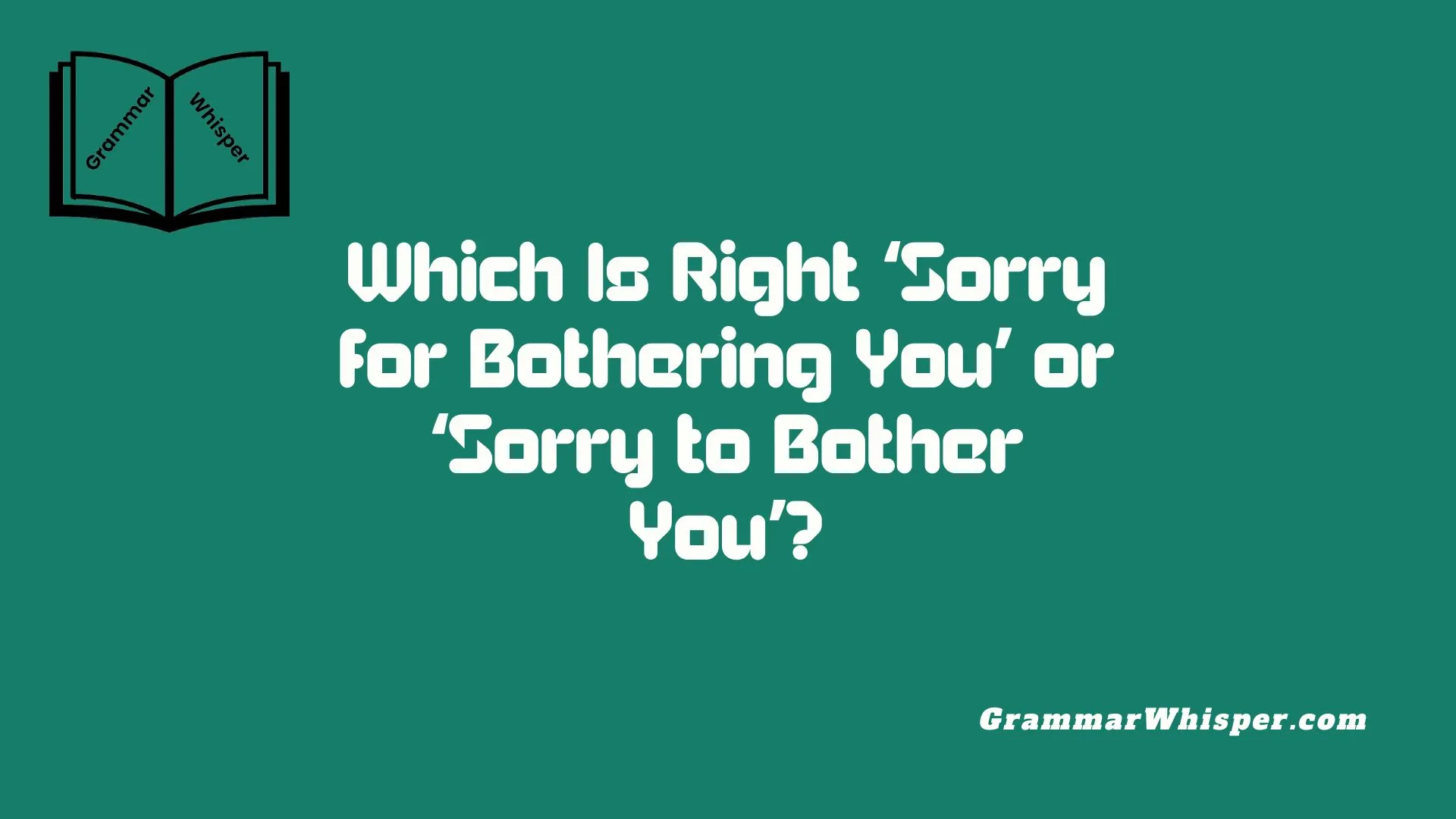In modern communication, especially in emails or chats, the way you express yourself can shape how others respond to you. It’s not just about what you say, but how you say it. Consider the polite phrase “Sorry for Bothering You’ or ‘Sorry to Bother You.” Though these similar expressions may appear interchangeable, they carry very different emotional tones and subtle grammatical nuances. I’ve used both in my work life and noticed how they land differently based on setting. That small shift in wording affects your tone, intent, and overall content during social interactions. It’s more than grammar – it’s about emotional awareness.
Understanding these phrases helps you thrive in professional communication. Knowing when to use each version – whether in a workplace email or a follow-up message – can significantly impact how you’re perceived. For example, “sorry to bother you” fits best before a polite request, while “sorry for bothering you” is better used after the action has occurred. These small choices demonstrate empathy and awareness. From real experience and observing real-world scenarios, I’ve realized that mastering these kinds of alternatives gives professionals an advantage – especially when interacting with global teams. Dive into the deeper layers like cultural perspectives, and you’ll find that grammar breakdowns and a clear guide are essential tools for fluent, thoughtful communication.
Understanding the Core: ‘Sorry for Bothering You’ vs. ‘Sorry to Bother You’
These two phrases serve the same core function: a polite interruption. Yet, the structure and tone differ.
- “Sorry to bother you” uses the infinitive form (to + verb). It’s slightly more direct and often used before the interruption.
- “Sorry for bothering you” uses the gerund form (verb + -ing). It’s reflective, often said after or during the interruption.
Comparison Chart
| Phrase | Form | Tone | Usage Context |
| Sorry to bother you | Infinitive | Proactive | Before asking a question |
| Sorry for bothering you | Gerund | Reflective | After or during a request |
Both are grammatically correct. The choice often depends on timing and tone.
The Psychology and Purpose Behind the Phrase
Why do we feel the need to apologize when interrupting someone? The reason lies in social psychology:
- Politeness softens intrusion. It shows you value the other person’s time.
- Apologies maintain harmony. They prevent conflict, especially in high-stakes environments.
- People fear being a burden. Saying sorry is a reflex to mitigate discomfort.
“Politeness is the lubrication of social communication.” – Dr. Robin Lakoff, Linguist
However, over-apologizing can backfire. In professional settings, constant “sorry” may project insecurity rather than courtesy.
Common Real-Life Situations Where These Phrases Appear
In the Workplace: Email, Meetings, and Remote Chats
In business, these phrases are common in:
- Follow-up emails
- Slack or Teams messages
- Meeting interruptions
Examples:
- “Sorry to bother you, but have you reviewed the document?”
- “Sorry for bothering you again, just following up on the client feedback.”
Table: Business Usage Dos and Don’ts
| Do | Don’t |
| Use “Sorry to bother you” before a request | Overuse “sorry” in every line |
| Keep it concise and clear | Apologize excessively |
| Pair with context (“Just a quick question”) | Interrupt without notice |
In Social Interactions: Respecting Time and Space
When texting or calling friends, politeness can smooth the way:
- “Hey, sorry to bother you. Are you free for a quick call?”
- “Sorry for bothering you so late, but I need some advice.”
These show respect for the person’s availability without sounding robotic.
In Customer Service: Appeasing Without Over-Apologizing
Customer support often uses these phrases to:
- De-escalate complaints
- Express empathy
Example: “I’m really sorry for bothering you again. We’re actively working on your issue.”
The phrase acknowledges inconvenience while signaling ongoing support.
Grammar Check: Gerund vs. Infinitive and Why It Matters
Understanding the grammar behind these phrases enhances their effectiveness.
- Gerund (bothering): Used when referring to an action that happened or is happening. Reflects on the act itself.
- Infinitive (to bother): Focuses on the intent to perform the action.
Diagram: Sentence Function
[Sorry] + [for bothering you] → Apology for current/past action
[Sorry] + [to bother you] → Apology before taking action
The distinction is subtle but powerful.
Tense and Timing: The Role of Grammar in Politeness
Examples of Tense Usage:
- Present: “Sorry I’m bothering you during lunch.”
- Past: “Sorry I bothered you yesterday.”
- Future/Intentional: “Sorry to bother you, but I need your signature.”
Timing changes both the grammatical tense and the social tone.
Doing It Right: Clear Examples of Each Usage in Context
Professional Contexts
- “Sorry to bother you, but I need access to the report.”
- “Sorry for bothering you again; I know you’re swamped.”
Social Examples
- “Hey, sorry to bother you on your weekend.”
- “Sorry for bothering you with my long texts.”
Customer Service Examples
- “I’m really sorry to bother you again. Here’s your updated order status.”
- “Sorry for bothering you repeatedly – we appreciate your patience.”
Context Table: Best Phrase per Scenario
| Scenario | Best Phrase | Why It Works |
| First-time request | “Sorry to bother you” | Softens the approach |
| Multiple follow-ups | “Sorry for bothering you again” | Acknowledges repetition |
| Casual text | “Sorry for bothering you” | Shows respect for time |
| Urgent but polite ask | “Hate to interrupt, but…” | Balances urgency and respect |
Alternative Phrases to Use Instead
To avoid overusing the word “sorry,” you can try:
- “I know you’re busy, but…”
- “Quick question if you have a moment.”
- “Hope I’m not catching you at a bad time.”
- “Just wanted to follow up on this.”
- “Would you mind if I asked something?”
Phrase Replacement Table
| Alternative Phrase | Tone | When to Use |
| “I know you’re busy, but…” | Empathetic | Emails, workplace |
| “Quick question…” | Neutral | Chat messages, informal settings |
| “Hope I’m not catching you…” | Casual-polite | Text messages, social conversations |
| “Would you mind if I…” | Formal | Interview settings, client communication |
When NOT to Use These Phrases
Avoid using these phrases:
- When urgency is more important than politeness
- In leadership communication that requires confidence
- If you’ve already apologized multiple times
Too many apologies can dilute your authority and frustrate recipients.
Cultural Differences: Apologizing in English vs. Other Languages
British vs. American English
- British speakers use “sorry” even more frequently.
- Americans tend to balance between “sorry” and directness.
Global Comparison
| Language | Common Courtesy Phrase | Cultural Note |
| Japanese | “Sumimasen” | Used for gratitude and apology |
| Spanish | “Perdón” or “Disculpa” | Used to interrupt or express regret |
| German | “Entschuldigung” | Formal, used sparingly |
| American English | “Sorry to bother you” | Common in work and email contexts |
Cultural expectations shape how these phrases are interpreted and received.
Final Thoughts
Politeness enhances communication, but clarity builds trust. Mastering when and how to use phrases like “Sorry to bother you” or “Sorry for bothering you” will elevate your personal and professional interactions.
Key Takeaways:
- Both phrases are correct but differ in timing and tone.
- Use infinitives for proactive apologies, gerunds for reflective ones.
- Avoid over-apologizing – opt for clarity and empathy instead.
- Consider alternatives and cultural context for better communication.
“Politeness is not weakness. It’s precision with empathy.”
Mastering polite expressions is not just about grammar – it’s about emotional intelligence, context, and respect. Choose your words wisely.
FAQs
Is “Sorry to bother you” more polite than “Sorry for bothering you”?
Both are polite. “Sorry to bother you” is proactive and slightly more direct. “Sorry for bothering you” is reflective and often softer.
Which phrase is more formal?
“Sorry to bother you” is generally more formal and often used in business emails or initial outreach.
Can I use these phrases in written emails?
Yes, especially in follow-ups, requests, or cold emails. Just don’t overdo it.
What’s a good alternative to avoid sounding repetitive?
Try “Quick question,” or “Hope I’m not interrupting,” depending on context.
Do native speakers use both?
Absolutely. It depends on tone, context, and relationship with the listener.











